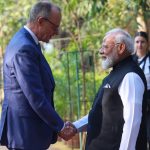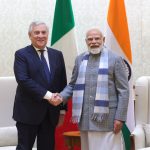 HANOI: The Delhi-Hanoi maritime bonding is set to get stronger in days to come. Vietnam, the emerging dynamo of the Southeast Asia region, is closely watching the forthcoming visit of India’s Prime Minister Narendra Modi to China and is expecting that the Indian leader will pitch for peace and stability in South China Sea, the site of conflicting territorial claims.
HANOI: The Delhi-Hanoi maritime bonding is set to get stronger in days to come. Vietnam, the emerging dynamo of the Southeast Asia region, is closely watching the forthcoming visit of India’s Prime Minister Narendra Modi to China and is expecting that the Indian leader will pitch for peace and stability in South China Sea, the site of conflicting territorial claims.
Vietnam has faced the brunt of the perceived Chinese assertiveness in South China Sea and has looked up to India, with its rising stature and formidable naval apparatus, as an anchor of stability in the maritime domain in the region.
“The Indian government has shown increased interest in protecting sea lanes of communication. We expect India will continue to support Vietnam and help it to cope up with instability in South China Sea,” Mr Le Van Nghiem, Director General, Directorate of External Information, told a group of visiting Indian journalists in the balmy Vietnamese capital.
“Many countries are reluctant to take up the issue with China. If India raises its voice (on South China Sea with Vietnam), it would be beneficial for both India and Vietnam and the region,” the Vietnamese official said. He was responding to a question by this writer on whether Vietnam expected Prime Minister Modi to take up the issue of South China Sea during his talks with the Chinese president next month.
However, instead of taking a confrontational stance vis-à-vis Beijing, the Vietnamese official stressed that Hanoi was hoping that improved relations between New Delhi and Beijing will be good for Vietnam and the region as well.
He also stressed that India’s OVL, the overseas arm of energy major ONGC Videsh Limited, has been carrying out oil exploration in areas claimed by China, indicating that the energy cooperation between the two countries will continue apace in the teeth of opposition by Beijing.
Mr Modi is set to visit China May 14-16, his maiden visit to Asia’s most powerful economy which is expected to scale up India-China relations in virtually all areas. China’s assertive postures in South China Sea, the contested water body which is claimed by five Southeast Asian countries, including Vietnam, has been a cause of concern for New Delhi, which has consistently pitched for freedom of navigation in the sea lanes of communication.
 Under Prime Minster Modi’s watch, Vietnam has emerged as a key pillar of India’s Act East policy, with a string of high-profile two-way visits seen in the last few months. Signalling the intent for closer strategic embrace, India rolled out the red carpet for Vietnam’s prime minister in October 2014, a little over a month after President Pranab Mukherjee’s substantive visit to Vietnam.
Under Prime Minster Modi’s watch, Vietnam has emerged as a key pillar of India’s Act East policy, with a string of high-profile two-way visits seen in the last few months. Signalling the intent for closer strategic embrace, India rolled out the red carpet for Vietnam’s prime minister in October 2014, a little over a month after President Pranab Mukherjee’s substantive visit to Vietnam.
 During Vietnamese Prime Minister Nguyen Tan Dung’s visit to India last year, Mr Modi had announced that India will quickly activate a $100 million Line of Credit that will enable Hanoi to buy four naval patrol vessels. These India-supplied vessels will help Vietnam to protect its sovereignty interests in South China Sea where it is locked into a bitter territorial spat with China.
During Vietnamese Prime Minister Nguyen Tan Dung’s visit to India last year, Mr Modi had announced that India will quickly activate a $100 million Line of Credit that will enable Hanoi to buy four naval patrol vessels. These India-supplied vessels will help Vietnam to protect its sovereignty interests in South China Sea where it is locked into a bitter territorial spat with China.
After their meeting, the two leaders had called for “restraint” and “freedom of navigation” in the South China Sea,” and “agreed that freedom of navigation and overflight in the East Sea/South China Sea should not be impeded.” “The (leaders called on the) parties concerned to exercise restraint, avoid threat or use of force and resolve disputes through peaceful means in accordance with universally recognised principles of international law,” said the joint statement.
Unlike the previous Manmohan Singh government which followed the policy of “this far and no further” in its relations with Vietnam, Mr Modi has shown more diplomatic chutzpah, and is determined to push the envelope in expanding defence and strategic ties with the Southeast Asian country. This explains Hanoi’s enthusiasm about Mr Modi, which will be in fuller play when the Indian leader visits Vietnam later this year.
(Manish Chand, Editor-in-Chief of India Writes Network, www.indiawrites.org, was in Vietnam at the invitation of the Vietnamese government)
Author Profile

- Manish Chand is Founder and Editor-in-Chief of India Writes Network (www.indiawrites.org) and India and World, a pioneering magazine focused on international affairs. He is CEO, Centre for Global India Insights, an India-based think tank focused on global affairs.
Latest entries
 India and the WorldJanuary 13, 2026India, Germany raise the bar for defence, economic ties
India and the WorldJanuary 13, 2026India, Germany raise the bar for defence, economic ties India and the WorldDecember 12, 2025India-Italy bonding: Tajani’s visit raises the bar for business, maritime ties
India and the WorldDecember 12, 2025India-Italy bonding: Tajani’s visit raises the bar for business, maritime ties In ConversationNovember 26, 2025G20 is a Force for global Good
In ConversationNovember 26, 2025G20 is a Force for global Good articlesNovember 26, 2025Rescuing G20 from North-South divide: Ubuntu Moment
articlesNovember 26, 2025Rescuing G20 from North-South divide: Ubuntu Moment







